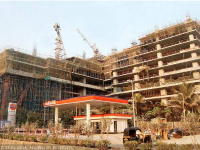By the year 2016 in the month of May 1, RERA act taken into force in the real estate field, hence the real estate agent consider a short-supply and albeit temporarily, as fresh realty project launches is get belated on account of current stricter terms and conditions. Here the short-supply joined to develop the major construction cost and it is expected to increase the property prices in a short time, that said by experts and real estate agent.
If it is more compliance on the new project launches, then it will be postponed. Due to the great demand increase, there will be changes to get delay to launch the fresh new project, which result into short-term supply. This said by the Jaxay Shah, president, Confederation of Real Estate Developers’ Associations of India (CREDAI).
Here around four to six month will be taking for the conversion of agriculture land into non-agriculture (NA). As result, the respective development plan passing as well as the environment clearance need around three months each. After getting such a permissions, the respective constructor need to apply for registration of state regulatory authority w that required one month’s time complete. When you inversed money on purchase a land by today, then it required up to 10 months for me to launch project,” said a city-based developer.
If the fresh project launches is being delayed due to accesses all the permissions by the developers before going to selling project to the buyers. Therefore, there is great demand in the market which has picked up and when the supply does not have proper match pace with demand, then it has chances to dry up the presence of stocks in the current market. Hence the Short supply will automatically get increase the prices of products.
Most of the Industry players will wait for the construction cost to hand over the developers so they need to deposit up to 70% of the money from respective investors as well as from buyers into a part account. It can use only for the purpose of construction of the new project. Then the Developers need to pay the full payments for buying the land as developer need to have land agreement previous to go for the registering of the respective projects. Then the Construction cost of the project will expect to increase up, when it is passed between the consumers and said a developer.
Due to the restricted supply in the delayed project, launches will have changes to increase property prices shortly, and then it will stabilize in longer run, which said by Nirav Kothari, MD, Ahmedabad office and he is JLL, a leading property consultant in the Ahmadabad.






